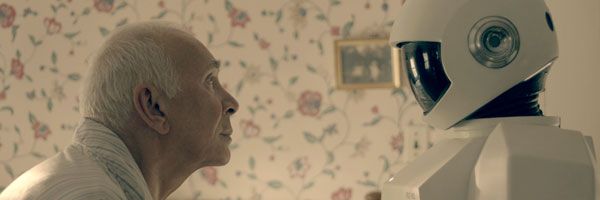One of my favorite films at this year's Sundance Film Festival was director Jake Schreier's Robot and Frank. The film is set in the near future and centers on an elderly ex-jewel thief (Frank Langella) whose kids (James Marsden and Liv Tyler) give him a caretaker robot (voiced by Peter Sarsgaard), sparking an unlikely friendship. Susan Sarandon plays a librarian who serves as Langella’s only friend. Since premiering at the Festival, Sony Pictures Worldwide Acquisitions and Samuel Goldwyn Films picked up the film for distribution, so you can expect to see it for yourself later this year. For more on the film, you can read Matt's review.Right after seeing the film I got to sit down with Frank Langella for an exclusive interview. During our extended conversation we talked about how he got involved in the project, how the script changed along the way, the design of the robot, the quick shooting schedule, filming on location, premiering it at Sundance, and a lot more. In addition, Langella talked about writing his first book. He told me, "It is called Dropped Names and it is about famous men and woman as I knew them from the age of 15 up to now, and I am dropping their names because they have dropped dead. It is about famous people who are dead." Hit the jump for more.As usual, I'm offering you two ways to get this interview: you can either click here for the audio, or the full transcript is below. Look for Robot and Frank later this year.Collider: Can you talk about how long ago you got attached to the project and what was it about the material that really spoke to you?Frank Langella: I got attached to it about a year ago in December. So it is about 14 or 15 months ago when I said yes. Then it went through what it takes to make a movie these days. It was months and months of “We have this actor and this actress but we don’t have this one. We are changing the script. The rewrites aren’t working. We are going to do it in this location. We are absolutely going May 1st. No, we are not.â€Â It was working it around my schedule and working it around the schedule of the other actors. It really is a jigsaw puzzle. We didn’t know we were going to go forward with it until 24 hours before the day of shooting when I was trying on clothes in my house that night.Isn’t it kind of exciting, though?Langella: Yeah, I liked it. I wanted to always make it. There were periods where I thought it wouldn’t get made, but I didn’t doubt that I wanted to make it.When you are agreeing to do a project how early into a script read do you feel that you are connecting to it or do you have to finish the script until the end to make sure that it has the three act journey that you are satisfied with?Langella: No, if it doesn’t have in the first 10 or 15 pages, even if my character has yet it to come in, if it doesn’t have something that draws me to it I don’t usually read the rest of it. Rarely have I made myself go through with something that was horrible in my mind in the first 20 pages that suddenly changed in the end. If it is horrible in first 20 pages then it is pretty horrible.There are a lot of changes that happen from when you first get the script to when you are on set. Sometimes it sticks to the script, but oftentimes there are radical rewrites. For this particular project and your character’s arch, how close to the script did the final film end up being?Langella: Not tremendously close. The arch of it was the same. The robbery, his teaching the robot how to steal, and we can’t say things that would reveal a marvelous moment. A lot of those things were the same. But his relationship to the robot and his scenes where he is beginning to fall apart were all written in a collaborative way with me because I am that age and they wanted to hear how I would feel in those situations. So I would just talk and [Screenwriter] [Christopher D.] Ford make notes and come back. Every time he would come back it was better.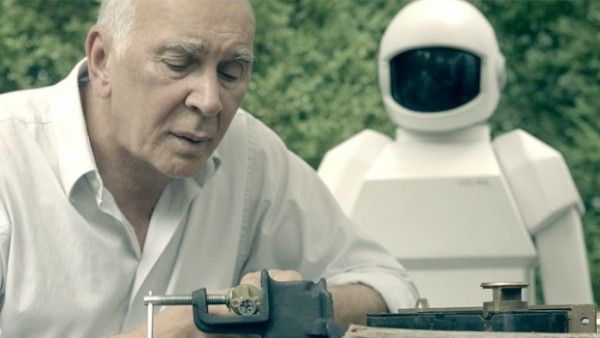 Can you talk about the collaboration on set? Obviously you guys made an indie movie so there is not a lot of time to sit there and change things. How was it on set as far as improvising a scene, changing a scene, or tweaking a scene?Langella: It was as close to an improvised movie as I have ever done given the fact that we said the lines as written for the most part. But it was left to a kind of easy rapport between James [Marsden], Susan [Sarandon], and Liv [Tyler]. And even sometimes with the robot, but you can’t adlib too much because the robot can’t adlib back. But a lot of it was spur of the moment happenings. I think one of the fights between James and I we just let it go to see what would happen between us.Some actors like the Clint Eastwood method of 2 takes while some actors love the David Fincher method of 50 or 100 takes. Where do you fall in that line and what is the most takes that you have ever done?Langella: I am in favor of one take if I think the honesty and the freshness were all there and the director feels it, and then usually you do a second for safety. Three or four is ok by me, but after that you start acting and that is the dangerous part. You have to be very careful to make it look like you’re not. The directors I have worked with who have done the most takes were Ron Howard, Roman Polanski, and Adrian Lyne. I suppose Adrian probably wins with 37 or 38 takes. Ron gets very close but Adrian takes it.Can you talk about working with the robot? It is very simple but elegant. It is a great look. Can you talk about your reaction when you first saw the design? Did you purposefully not look at it before getting on set or were you being shown and told what it was going to be?
Can you talk about the collaboration on set? Obviously you guys made an indie movie so there is not a lot of time to sit there and change things. How was it on set as far as improvising a scene, changing a scene, or tweaking a scene?Langella: It was as close to an improvised movie as I have ever done given the fact that we said the lines as written for the most part. But it was left to a kind of easy rapport between James [Marsden], Susan [Sarandon], and Liv [Tyler]. And even sometimes with the robot, but you can’t adlib too much because the robot can’t adlib back. But a lot of it was spur of the moment happenings. I think one of the fights between James and I we just let it go to see what would happen between us.Some actors like the Clint Eastwood method of 2 takes while some actors love the David Fincher method of 50 or 100 takes. Where do you fall in that line and what is the most takes that you have ever done?Langella: I am in favor of one take if I think the honesty and the freshness were all there and the director feels it, and then usually you do a second for safety. Three or four is ok by me, but after that you start acting and that is the dangerous part. You have to be very careful to make it look like you’re not. The directors I have worked with who have done the most takes were Ron Howard, Roman Polanski, and Adrian Lyne. I suppose Adrian probably wins with 37 or 38 takes. Ron gets very close but Adrian takes it.Can you talk about working with the robot? It is very simple but elegant. It is a great look. Can you talk about your reaction when you first saw the design? Did you purposefully not look at it before getting on set or were you being shown and told what it was going to be? 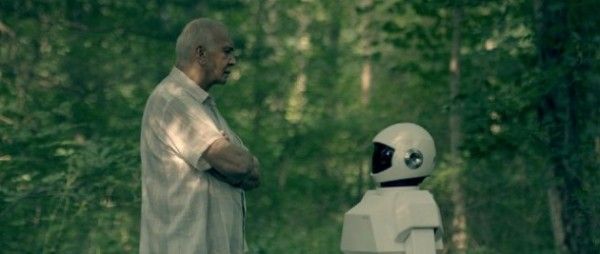 Langella: No, Jake [Schreier] sent me some sketches of it and he sent me a little book that he had made during all of the months and months that it appeared that we weren’t going to make it happen. So one day he sent me the booklet with the robot and it reenthused me with the visual of it. And then I didn’t see the robot until the first day that I was on the set with the actual creature and the human being inside of it.What was that like working opposite with? Was anyone saying the lines at the point?Langella: It was different people. My nephew came on the film. I got him a job as a gaffer starting out. The girl who was playing the robot had a very small voice and couldn’t be heard when she was inside of it and she also had very complicated things to do physically. So I said, “Just let Andy read the lines.â€Â Then sometimes she read a line and sometimes Jake read and sometimes Andy and sometimes nobody did. It didn’t matter to me because my robot was already in me. My personal connection was with something that had nothing to do with their voices. So whoever said the line – it didn’t matter. I was playing to my secret robot.When you are getting ready to do a role how early on are you getting ready, finding the character, and figuring it out?
Langella: No, Jake [Schreier] sent me some sketches of it and he sent me a little book that he had made during all of the months and months that it appeared that we weren’t going to make it happen. So one day he sent me the booklet with the robot and it reenthused me with the visual of it. And then I didn’t see the robot until the first day that I was on the set with the actual creature and the human being inside of it.What was that like working opposite with? Was anyone saying the lines at the point?Langella: It was different people. My nephew came on the film. I got him a job as a gaffer starting out. The girl who was playing the robot had a very small voice and couldn’t be heard when she was inside of it and she also had very complicated things to do physically. So I said, “Just let Andy read the lines.â€Â Then sometimes she read a line and sometimes Jake read and sometimes Andy and sometimes nobody did. It didn’t matter to me because my robot was already in me. My personal connection was with something that had nothing to do with their voices. So whoever said the line – it didn’t matter. I was playing to my secret robot.When you are getting ready to do a role how early on are you getting ready, finding the character, and figuring it out?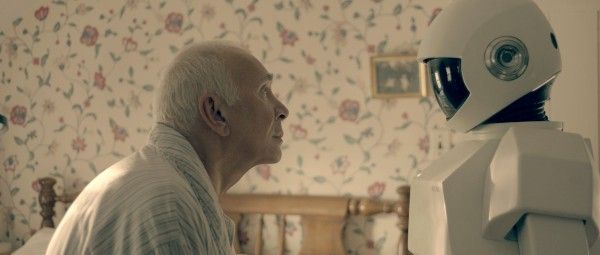 Langella: It depends upon the project. Frost/Nixon was months and months of looking at all of the Nixon tapes because I had to be loyal to a certain sense of him. This movie was not very much. This movie was trusting that I was 72, that my cognitive powers are fine, that I understand what getting older is about, that I understand what the fear about that is, I know what estrangement can be like with your kids since I’ve gone through those periods, I know what looking at a girl that you want to ask out on a date is like and not quite knowing if she will say yes. I know all of that stuff. So you don’t have to work too hard. Sometimes you have to get out of your own way as an actor. Young actors tend to over prepare sometimes and over think it. And actually there is nothing wrong with walking on a set with an empty brain and then on action allowing your adrenaline and your trust in yourself to take over. Sometimes you film in order but it is very rare. How close to in order were you able to do any part of this film or was it due to scheduling all over the place?Langella: It was all over the place. We only had Susan for three days and we only got James on the last four days of the shoot and Liv only came in for maybe five days, and they all came in at different times. Trying to coordinate their three schedules…I was on the film for 30 days or whatever it was but we had to bend to their schedules. So Susan would be available on a Saturday morning for five hours because she was shooting another picture in Connecticut. So we had to get as much as we could with Susan. Then James would come in, as he did in the last four days, and we had to shoot. For instance me walking down the road in the opening of the movie with James coming – we shot that in the last two days.We are obviously at Sundance right now. What does it mean for you to be part of the festival with this particular project?
Langella: It depends upon the project. Frost/Nixon was months and months of looking at all of the Nixon tapes because I had to be loyal to a certain sense of him. This movie was not very much. This movie was trusting that I was 72, that my cognitive powers are fine, that I understand what getting older is about, that I understand what the fear about that is, I know what estrangement can be like with your kids since I’ve gone through those periods, I know what looking at a girl that you want to ask out on a date is like and not quite knowing if she will say yes. I know all of that stuff. So you don’t have to work too hard. Sometimes you have to get out of your own way as an actor. Young actors tend to over prepare sometimes and over think it. And actually there is nothing wrong with walking on a set with an empty brain and then on action allowing your adrenaline and your trust in yourself to take over. Sometimes you film in order but it is very rare. How close to in order were you able to do any part of this film or was it due to scheduling all over the place?Langella: It was all over the place. We only had Susan for three days and we only got James on the last four days of the shoot and Liv only came in for maybe five days, and they all came in at different times. Trying to coordinate their three schedules…I was on the film for 30 days or whatever it was but we had to bend to their schedules. So Susan would be available on a Saturday morning for five hours because she was shooting another picture in Connecticut. So we had to get as much as we could with Susan. Then James would come in, as he did in the last four days, and we had to shoot. For instance me walking down the road in the opening of the movie with James coming – we shot that in the last two days.We are obviously at Sundance right now. What does it mean for you to be part of the festival with this particular project?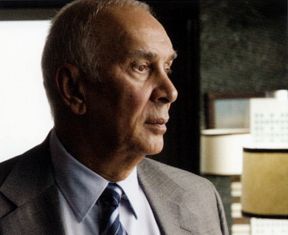 Langella: I like being here because I like being around all the youth that is here. I like the feeling. Energy is an overused word, but I indeed like the feeling. I am ready to go home and I’ve had enough. But I do like the sense of excitement and I wouldn’t like it if the movie was so deliriously well received.Were you at the theater yesterday for the first public screening?Langella: Yeah.What was that energy like? I read reviews and tweets online and everyone was very enthusiastic. Did you feel the energy in the theater as you were watching it for the first time with a huge audience?Langella: Yes. But I must say that we all came in this morning ten minutes before the end of the movie that was being shown with another audience and it was breathtaking. The sound of the audience, the way they greeted us, and people wiping their eyes with handkerchiefs – it really was thrilling.I was in that audience this morning at The Library. It played extremely well.Langella: I’ll never forget it.You’ve done so much great work throughout a long career. When you are in line at Starbucks what is the one project that people always want to talk to you about?
Langella: I like being here because I like being around all the youth that is here. I like the feeling. Energy is an overused word, but I indeed like the feeling. I am ready to go home and I’ve had enough. But I do like the sense of excitement and I wouldn’t like it if the movie was so deliriously well received.Were you at the theater yesterday for the first public screening?Langella: Yeah.What was that energy like? I read reviews and tweets online and everyone was very enthusiastic. Did you feel the energy in the theater as you were watching it for the first time with a huge audience?Langella: Yes. But I must say that we all came in this morning ten minutes before the end of the movie that was being shown with another audience and it was breathtaking. The sound of the audience, the way they greeted us, and people wiping their eyes with handkerchiefs – it really was thrilling.I was in that audience this morning at The Library. It played extremely well.Langella: I’ll never forget it.You’ve done so much great work throughout a long career. When you are in line at Starbucks what is the one project that people always want to talk to you about?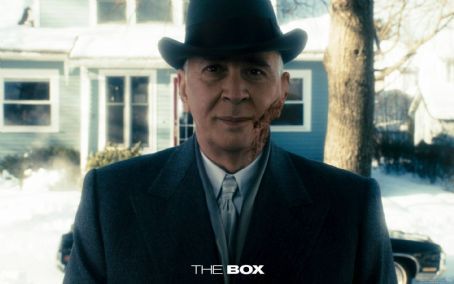 Langella: I don’t go into Starbucks – never. But when I’m in line anywhere….it changes and it changes according to the people. I’ve noticed that a movie I did called The Box is very, very popular with black folk. So when I go to a place where there is a lot of black folk they come up to me and talk to me about The Box. If I got to another place where there is an older crowd they will talk to me about Frost/Nixon. If I talk to baby boomers they will want to talk about Masters of the Universe. So it is all over the place. It is also sometimes what has been shown on a cable network. Like BET showed The Box a lot. So I got a tremendous amount of response of it.I have a few friends who are actors and they have mentioned that if something shows on HBO on Saturday night then on Monday everyone wants to talk to you about it.Langella: Yes, it’s true.What are you looking for right now in scripts or in projects that you might want to do in the future? Is there a particular genre or are you just looking for a good script?Langella: With me it is a good script and a good character. I’m lucky because there are four or five of them in the next year or so. It is just a great time for me. There are interesting parts coming my way. So anything that will put me in a different place and what I love about Robot and Frank is that I have played a lot of villains in the last two or three years. Some critic wrote “The moment I saw Frank Langella come on screen I knew we were in for trouble.â€Â So I thought, “Oh, ok.†and this a sweet guy. So it is nice to play a sweet man.What is funny is that he is very sweet but he does have a little bit of an underside.Langella: Oh, yeah. He can be nasty.For the stuff that you might be doing, are you looking for a particular role like being an ultra good character?Langella: No, I am always responding. If it is a really great villain I can’t resist it. But if it is a man like this that is a combination of vulnerable, tender, sweet, and also rough on his son and stuff – it just a good part. Any actor would tell you. It just pops off the page and you know.We haven’t talked about the rest of the cast and they are great in it. Did you have any time to rehearse for this film?Langella: None. Susan and I drove up to the parking lot on the first day of her shooting. I think it was close to my first day or it was my first day. She got out of the car and said, “Hey, babe.†and we gave a kiss and a hug. She had her pages in her hand and I had mine. We walked in and Jake talked a little bit. I think it was my entrance in the library because she was pasting the books and we just did it.You were on location in certain places. What is that like for you? Do you prefer being in soundstages or do you prefer being on location?Langella: Every one of them has a perk to it and every one of them has a drawback. I like being locations. It’s fun. I like being in the real places, but you don’t have anywhere near the creature comforts when you have to shoot in that little house. It is very hot and very small. That bedroom where James and I did all of those scenes is tiny. Where I had to do the scene with the robot was small, hot, and sticky. It would be me, the robot, Jake, the cameraman, and everybody is trying to move around each other. On a soundstage walls can be moved out and camera moves can be greater. But the cinematographer on this film did beautiful.
Langella: I don’t go into Starbucks – never. But when I’m in line anywhere….it changes and it changes according to the people. I’ve noticed that a movie I did called The Box is very, very popular with black folk. So when I go to a place where there is a lot of black folk they come up to me and talk to me about The Box. If I got to another place where there is an older crowd they will talk to me about Frost/Nixon. If I talk to baby boomers they will want to talk about Masters of the Universe. So it is all over the place. It is also sometimes what has been shown on a cable network. Like BET showed The Box a lot. So I got a tremendous amount of response of it.I have a few friends who are actors and they have mentioned that if something shows on HBO on Saturday night then on Monday everyone wants to talk to you about it.Langella: Yes, it’s true.What are you looking for right now in scripts or in projects that you might want to do in the future? Is there a particular genre or are you just looking for a good script?Langella: With me it is a good script and a good character. I’m lucky because there are four or five of them in the next year or so. It is just a great time for me. There are interesting parts coming my way. So anything that will put me in a different place and what I love about Robot and Frank is that I have played a lot of villains in the last two or three years. Some critic wrote “The moment I saw Frank Langella come on screen I knew we were in for trouble.â€Â So I thought, “Oh, ok.†and this a sweet guy. So it is nice to play a sweet man.What is funny is that he is very sweet but he does have a little bit of an underside.Langella: Oh, yeah. He can be nasty.For the stuff that you might be doing, are you looking for a particular role like being an ultra good character?Langella: No, I am always responding. If it is a really great villain I can’t resist it. But if it is a man like this that is a combination of vulnerable, tender, sweet, and also rough on his son and stuff – it just a good part. Any actor would tell you. It just pops off the page and you know.We haven’t talked about the rest of the cast and they are great in it. Did you have any time to rehearse for this film?Langella: None. Susan and I drove up to the parking lot on the first day of her shooting. I think it was close to my first day or it was my first day. She got out of the car and said, “Hey, babe.†and we gave a kiss and a hug. She had her pages in her hand and I had mine. We walked in and Jake talked a little bit. I think it was my entrance in the library because she was pasting the books and we just did it.You were on location in certain places. What is that like for you? Do you prefer being in soundstages or do you prefer being on location?Langella: Every one of them has a perk to it and every one of them has a drawback. I like being locations. It’s fun. I like being in the real places, but you don’t have anywhere near the creature comforts when you have to shoot in that little house. It is very hot and very small. That bedroom where James and I did all of those scenes is tiny. Where I had to do the scene with the robot was small, hot, and sticky. It would be me, the robot, Jake, the cameraman, and everybody is trying to move around each other. On a soundstage walls can be moved out and camera moves can be greater. But the cinematographer on this film did beautiful.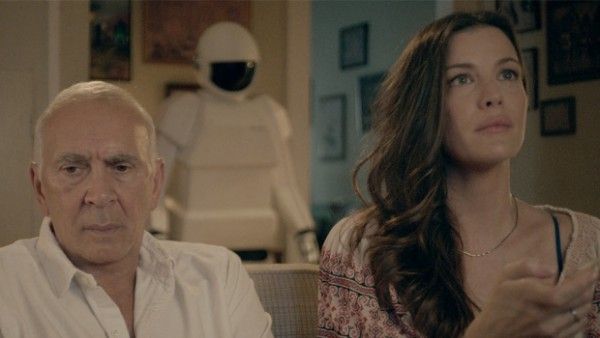 I agree. I think one of the reasons why the film hit a nerve for me and I think for a lot of people is that we are not so far from what this film is presenting with having a robot helping you out. I think we are not that far away. Can you talk about that and how we are on the precipice of this technology?Langella: My kids are in their late 20s so they don’t have anything to compare this age to. They grew up in it and they think it is perfectly ok. I take great issue with it because I like the intercommunication and I like how human beings touch, look, feel, laughter, happiness, and all the things that go with sharing yourself with humans. But I think we are heading more and more towards people being isolated from each other.It is funny because you have an iPhone and I have my phone. When I grew up it was phone calls and now when you call someone on the phone they are almost alarmed as if something bad has happened because everyone is now texting or emailing. Has that invaded your life as well?Langella: This is six months old. I’ve only had it for six months. I have it because my daughter said, “Would you please get into the 21st century?†because I had a little flip phone. But I have noticed in those six months is that in the first two months that I had this I didn’t know how to text but now that I do know how to text it is easier, but it is more dangerous,. You don’t hear the voice. You don’t hear somebody say, “Where are you? Hurry up! I’m looking forward to it! Come on, I miss you. Hurry up!â€Â You don’t hear that.When it was all said and done and you finally saw the picture what was your initial reaction? Sometimes when you sign on to a project it can sound great and everything sounds perfect but when you finally get to the end it just didn’t work.Langella: That is most of the time.What I think a lot of people don’t recognize is that no one sets out to make a bad movie – it just didn’t work out. But then you have something like this where it is just great. What was your reaction when you first saw it?Langella: I was stunned. I remember Jake showed me when it was on its way to something. I was in my dressing room doing a play and I said. “This is so much better than I thought it was going to be.â€Â Then he showed it to me. He came up to my house in the country and he had improved it. Then I saw it in Brooklyn on his big screen about three nights ago. I thought, “I hope people are touched by this because I am.â€You have written a book.Langella: Yes, my first book is coming out at the end of March. It is called Dropped Names and it is about famous men and woman as I knew them from the age of 15 up to now, and I am dropping their names because they have dropped dead. It is about famous people who are dead.Do you mind saying a few of the people?Langella: No, it is from the time I was 15 years old. It starts with Marilyn Monroe. It is George C. Scott, Elizabeth Taylor, Jackie Onassis, President Kennedy, the Queen Mother, Jill Clayburgh, Raul Julia, Jessica Tandy. It is greats of the theater, greats of the movies, and great politicians. It is the people I have met from 15 to now who have left impressions on me that I met on the happenstance of life who all happened to be famous.Is it salacious or about how the people were like?Langella: It is about their essence and it s about to a degree about the effect they had on me. So when I was a kid at 15 by chance I met Marilyn Monroe. It was a brief encounter but it had an enormous effect on me. Then I got to know actors and actresses through working with them. Then I found myself suddenly walking into Queen Elizabeth’s private box at a horse race because I was dating someone whose father had a horse running. It is all of the accidents of life that bring you suddenly into a room with the president, a socialite, or a movie star.Have you kept journals?Langella: It all stayed in my head. Sometimes I would scribble down stuff like little memories. I met President Kennedy when I was 24 years old. When I went home that evening I thought, “My god. I just had lunch with President Kennedy.â€Â So I wrote down what the menu was so that I could remember.I was a huge fan of Raul Julia. What was he like outside from what I knew of seeing him on the screen?Langella: He was sort of what you kind of would imagine a man like Javier Bardem is like. He was a man’s man and he was funny. He was outrageous, caring, warm, and he sang beautifully. He would burst into song. Right now if he felt like singing as opera he would start singing at you. He was a wonderful actor to work opposite. He was a great, great friend.How long did it take you to write this and how long ago did you think about doing this?Langella: I started writing it in November of 2011 and I finished it about four days ago.Wow.Langella: Writing it was easy. I wrote a 100 people and it now 65. But writing it was simple. The hardest part was honing it and deciding more than anything else what to leave out.Did you have an editor? I have a friend who wrote a book recently and he told me that he had to basically go somewhere and sit down from 9 to 5 away from people to actually write.Langella: I wrote every morning from about 5 to 9. It was quiet hours and everybody was asleep in the house. I would just sit in my study.I have spoken to many writers who have told me that they have a golden period where those first few hours you are very creative.Langella: They are the best. Some things would come later, but for the most part….I would literally get out of bed even before brushing my teeth and go right to my yellow legal pad because it was in my head and I just wanted to get it down before the rest of life started.Did you have someone who edited the whole thing?Langella: No, I did all that. I had somebody…they are doing it right now. They are proofing it and going through the grammar and stuff. But I felt very much that it had to be my words and my voice.Did you pitch a book company on this or did they come to you?Langella: I wrote the first piece in November because a friend of mine died. She was a famous actress and I wanted to commemorate it. Then I thought, “I think I might make this a book about all of the other people†And then I sent to a literary agent and she sent it to a few publishers and they all bit lucky for me.
I agree. I think one of the reasons why the film hit a nerve for me and I think for a lot of people is that we are not so far from what this film is presenting with having a robot helping you out. I think we are not that far away. Can you talk about that and how we are on the precipice of this technology?Langella: My kids are in their late 20s so they don’t have anything to compare this age to. They grew up in it and they think it is perfectly ok. I take great issue with it because I like the intercommunication and I like how human beings touch, look, feel, laughter, happiness, and all the things that go with sharing yourself with humans. But I think we are heading more and more towards people being isolated from each other.It is funny because you have an iPhone and I have my phone. When I grew up it was phone calls and now when you call someone on the phone they are almost alarmed as if something bad has happened because everyone is now texting or emailing. Has that invaded your life as well?Langella: This is six months old. I’ve only had it for six months. I have it because my daughter said, “Would you please get into the 21st century?†because I had a little flip phone. But I have noticed in those six months is that in the first two months that I had this I didn’t know how to text but now that I do know how to text it is easier, but it is more dangerous,. You don’t hear the voice. You don’t hear somebody say, “Where are you? Hurry up! I’m looking forward to it! Come on, I miss you. Hurry up!â€Â You don’t hear that.When it was all said and done and you finally saw the picture what was your initial reaction? Sometimes when you sign on to a project it can sound great and everything sounds perfect but when you finally get to the end it just didn’t work.Langella: That is most of the time.What I think a lot of people don’t recognize is that no one sets out to make a bad movie – it just didn’t work out. But then you have something like this where it is just great. What was your reaction when you first saw it?Langella: I was stunned. I remember Jake showed me when it was on its way to something. I was in my dressing room doing a play and I said. “This is so much better than I thought it was going to be.â€Â Then he showed it to me. He came up to my house in the country and he had improved it. Then I saw it in Brooklyn on his big screen about three nights ago. I thought, “I hope people are touched by this because I am.â€You have written a book.Langella: Yes, my first book is coming out at the end of March. It is called Dropped Names and it is about famous men and woman as I knew them from the age of 15 up to now, and I am dropping their names because they have dropped dead. It is about famous people who are dead.Do you mind saying a few of the people?Langella: No, it is from the time I was 15 years old. It starts with Marilyn Monroe. It is George C. Scott, Elizabeth Taylor, Jackie Onassis, President Kennedy, the Queen Mother, Jill Clayburgh, Raul Julia, Jessica Tandy. It is greats of the theater, greats of the movies, and great politicians. It is the people I have met from 15 to now who have left impressions on me that I met on the happenstance of life who all happened to be famous.Is it salacious or about how the people were like?Langella: It is about their essence and it s about to a degree about the effect they had on me. So when I was a kid at 15 by chance I met Marilyn Monroe. It was a brief encounter but it had an enormous effect on me. Then I got to know actors and actresses through working with them. Then I found myself suddenly walking into Queen Elizabeth’s private box at a horse race because I was dating someone whose father had a horse running. It is all of the accidents of life that bring you suddenly into a room with the president, a socialite, or a movie star.Have you kept journals?Langella: It all stayed in my head. Sometimes I would scribble down stuff like little memories. I met President Kennedy when I was 24 years old. When I went home that evening I thought, “My god. I just had lunch with President Kennedy.â€Â So I wrote down what the menu was so that I could remember.I was a huge fan of Raul Julia. What was he like outside from what I knew of seeing him on the screen?Langella: He was sort of what you kind of would imagine a man like Javier Bardem is like. He was a man’s man and he was funny. He was outrageous, caring, warm, and he sang beautifully. He would burst into song. Right now if he felt like singing as opera he would start singing at you. He was a wonderful actor to work opposite. He was a great, great friend.How long did it take you to write this and how long ago did you think about doing this?Langella: I started writing it in November of 2011 and I finished it about four days ago.Wow.Langella: Writing it was easy. I wrote a 100 people and it now 65. But writing it was simple. The hardest part was honing it and deciding more than anything else what to leave out.Did you have an editor? I have a friend who wrote a book recently and he told me that he had to basically go somewhere and sit down from 9 to 5 away from people to actually write.Langella: I wrote every morning from about 5 to 9. It was quiet hours and everybody was asleep in the house. I would just sit in my study.I have spoken to many writers who have told me that they have a golden period where those first few hours you are very creative.Langella: They are the best. Some things would come later, but for the most part….I would literally get out of bed even before brushing my teeth and go right to my yellow legal pad because it was in my head and I just wanted to get it down before the rest of life started.Did you have someone who edited the whole thing?Langella: No, I did all that. I had somebody…they are doing it right now. They are proofing it and going through the grammar and stuff. But I felt very much that it had to be my words and my voice.Did you pitch a book company on this or did they come to you?Langella: I wrote the first piece in November because a friend of mine died. She was a famous actress and I wanted to commemorate it. Then I thought, “I think I might make this a book about all of the other people†And then I sent to a literary agent and she sent it to a few publishers and they all bit lucky for me.

